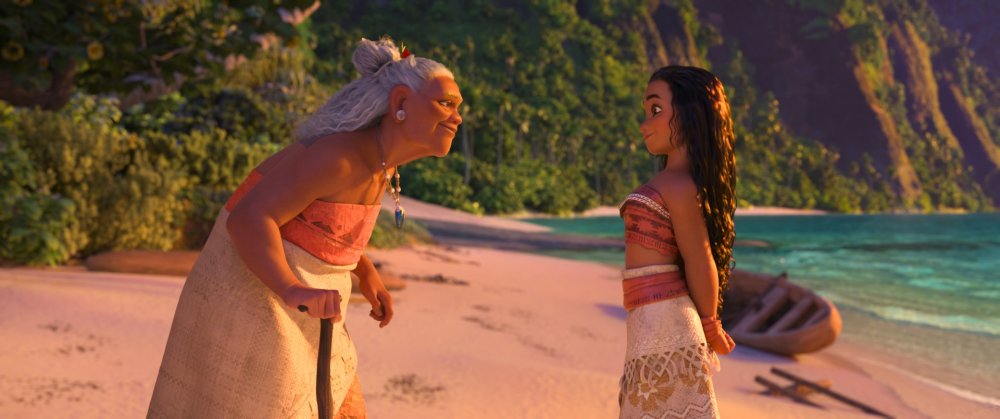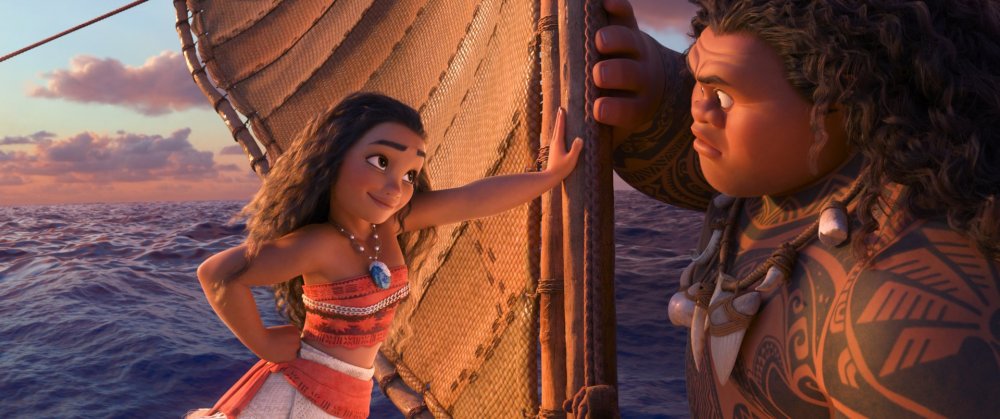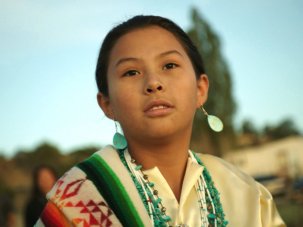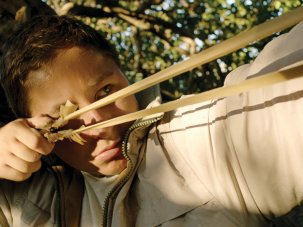Moana is an animated film of the subgenre codified at the start of the ‘Disney Renaissance’ by 1989’s The Little Mermaid. Both films are co-directed by Ron Clements and John Musker, and start from the same premise: a young woman next in line to be queen/chief chafes at the for-safety’s-sake boundaries imposed on her. Instead of being urged to stay under the sea, Polynesian Moana (voiced by Auli’l Cravalho) is supposed to stay far from it: her father Tui (Temuera Morrison) insists his people don’t venture past the coral reef. It’s as inevitable as her journey of self-discovery and vindication that, in between musical numbers, Moana will have reason to leave and prove herself. In this case, a complicated piece of mythology requires her to find the trickster demigod Maui (Dwayne Johnson) and have him restore the stone heart of goddess Te Fiti to prevent the destruction of her island.
USA 2016
Certificate PG 113m 29s (with short film Inner Workings)
Directors Ron Clements, John Musker
Voice cast
Moana Auli’l Cravalho
Maui Dwayne Johnson
Gramma Tala Rachel House
Chief Tui Temuera Morrison
Tamatoa Jemaine Clement
Sina Nicole Scherzinger
Heihei / Villager #3 Alan Tudyk
In 2D and 3D
2.35:1
Dolby Atmos
During the production period, Musker and Clements focused on the animation, while co-directors Don Hall and Chris Williams concentrated on the story. Moana’s attention to the details of Polynesian culture, costume and mythology is a far cry from Clements and Musker’s effectively racist Aladdin (1992); an extensive research period, which included ongoing input from scholars and anthropologists among others, gives the film some credibility. (Not all viewers have been pleased, though – some have taken offence at, for example, Maui’s sheer bulk, seeing it as perpetuating the stereotype of Polynesian obesity.)
Moana has no romantic interest at any point, and one dismissive line from Maui when he doubts her abilities as a sailor and tactician – “If you have a dress and an animal sidekick, you’re a princess” – is self-reflexive winking from Disney as it steps away from that particular retrograde formula. All of the primary voice cast are of Polynesian or New Zealand descent, and no other conspicuous errors of appropriation have been made.
Disney does not cheap out on its big-event animation films, and Moana looks like its $150m. The major achievement here is the water: 16 years after the publicity materials for The Perfect Storm rather pathetically and unconvincingly claimed that CG had finally mastered this element, the liquid is fully realised. Whether limpidly blue and transparent or grey and stormy, it’s totally believable – so much so that at odd moments it can appear as if CG characters are standing in front of a water tank filled with the real thing. Moana is, per her grandmother’s words, “chosen by the ocean” – specifically by a water tentacle that seems modelled on 1989’s The Abyss; a sequence with twinkling pinks and purples on the bottom of the ocean floor, as in the climax of that film, seems to confirm the debt, though maybe it’s just that Musker and Clements care as much about the science of depicting oceans properly as James Cameron once did. The realisation of Moana’s hair — completed strand by strand — and the grains of sand that at one point stick to her face are also formidable technical achievements.

The English-language songs are by Broadway’s Lin-Manuel Miranda, whose reputation outside the US was recently increased when vice-president-elect Mike Pence was booed at a performance of his Hamilton. (There are also songs here by Opetaia Foa’i in the Tokelauan language, appearing both as background elements in Miranda’s songs and standalone tracks.) The lyrics can be quite clever: a crab voiced by Jemaine Clement declares, “You can’t expect a demigod to beat a decapod.” But no matter who wrote the songs, there was always going to be a line about listening to your ‘inner voice’ – it’s pretty much Disney company policy. And there will be always be enervating dialogue about believing in yourself, or about how “sometimes our strengths lie below the surface”, or a variant on (Moana to the demigod) “The gods aren’t the ones that make you Maui. You are.”
All of these affirmational bromides are a regrettable staple of the late Disney corpus, and while they coincide nicely with the recent boom in self-proclaimed ‘empowerment ballads’, they do little to actually raise the spirits. This tiresome pablum is admittedly mostly frontloaded; the back half is a march from one big face-off to another, mediated by bonding between Maui and Moana. Disney addicts (they exist!) will be satisfied, and the film is, overall, harmless. But for all the technical skill on display, this feels as inessential and disposable as any Shrek or Ice Age, only with ostensibly loftier pretensions.
-
The Digital Edition and Archive quick link
Log in here to your digital edition and archive subscription, take a look at the packages on offer and buy a subscription.







